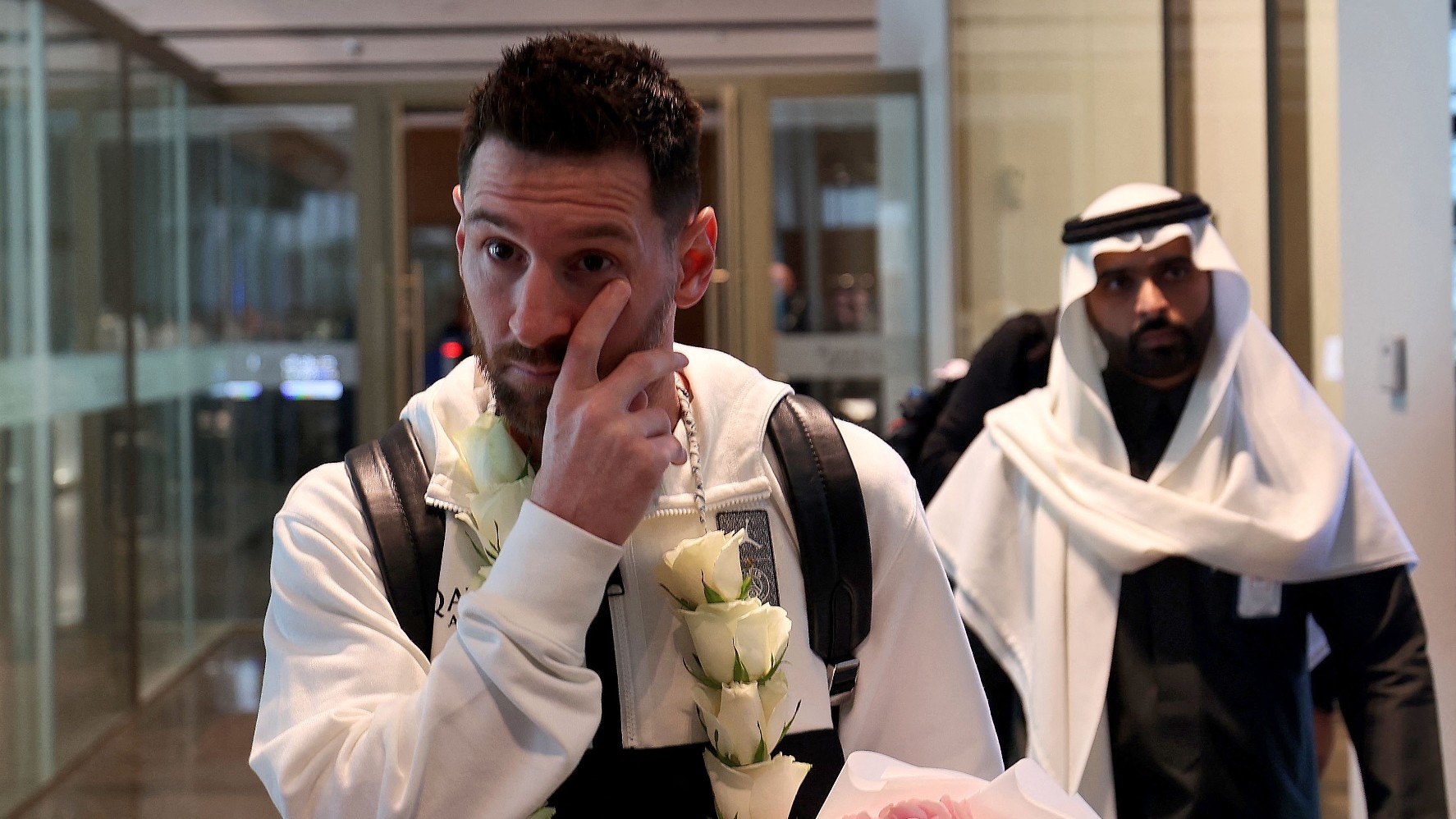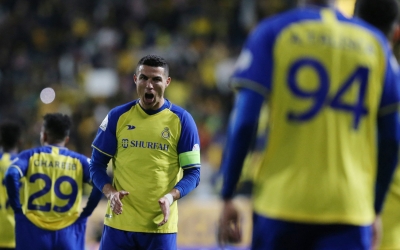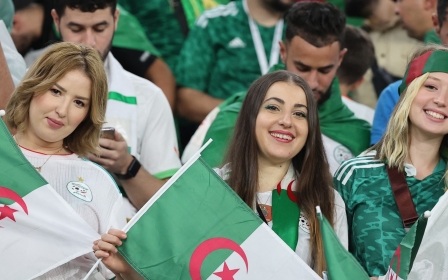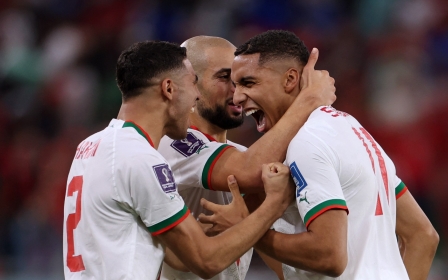Saudi Arabia: Lionel Messi will still be a promotional tool for the kingdom

When it was confirmed earlier this month that Lionel Messi would leave his French club Paris Saint-Germain at the end of the season, there was much speculation as to where he would go next.
It had been widely reported that the leading bid came from Saudi Arabia for Messi to join Al Hilal on a hugely lucrative contract in the region of $400m a season. But as it turned out, the Argentine football star favoured a move to the US to play for Inter Miami.
This makes Messi an exception in turning down the riches on offer in a summer that promises to be one of expensive player acquisitions for Saudi football clubs. French striker Karim Benzema moved to Al Ittihad earlier this month, with countryman N’golo Kante set to join him, and Portuguese superstar Cristiano Ronaldo joined Al Nassr late last year. Others will surely follow.
At 35 years of age, Messi is no longer the same force of nature that once struck fear in defenders with every touch of the ball. That said, it was only a matter of months ago that Messi reached arguably his career pinnacle - leading his nation to World Cup glory in Qatar in December 2022 - and he is considered by many fans and commentators to be one of the greatest footballers of all time.
Although not quite a return to FC Barcelona, with which he achieved so much, or even his boyhood club Newell’s Old Boys, there will be relief from supporters over the star who had hoped for a more romantic final chapter to his playing career.
New MEE newsletter: Jerusalem Dispatch
Sign up to get the latest insights and analysis on Israel-Palestine, alongside Turkey Unpacked and other MEE newsletters
Despite turning down the more lucrative of the bids presented to him by Al Hilal, the move to Miami is said to include commercial collaborations with brands such as Adidas and Apple. This comes as no surprise to those who have paid close attention to Messi’s commercial interests; he advertises everything from Budweiser to cryptocurrency.
The former PSG man was already the second-highest earning athlete, with the combined income from his salary and sponsorship deals reportedly totalling $130m, just a few million off the top earner, Ronaldo.
Tourism ambassador
Many commentators and journalists had argued that Messi’s substantial income from the various endorsement deals, as well as his playing contract, should mean he could afford to safeguard his legacy without needing to chase financial incentives that might tarnish his reputation.
However, despite the fact that he will - for now - not be playing in Saudi Arabia, his relationship with the kingdom will continue. Having visited and played there with both club and country several times, Messi has also represented Visit Saudi as a tourism ambassador since May 2022.
Reframing, or laundering as some critics see it, the country's global reputation is part of the Saudi strategy
The Saudi tourism minister, Ahmed al-Khateeb, welcomed him at the time with a message: “We are excited for you to explore the treasure of the Red Sea, the Jeddah Season 2022, and our ancient history. This is not his first visit to the Kingdom, and it will not be the last.” Former Saudi footballer Sami al-Jaber added: “It is a distinguished and unique step for Messi to become an ambassador for Saudi tourism due to the influence the player has, which will reflect positively on Jeddah’s position as a tourist destination.”
But Messi’s decision to become the face of Visit Saudi also spurred families of Saudi prisoners of conscience to write an open letter to the player. “You are a hero to millions - please use that status for good,” it noted. “Stand up for human rights and say no to the butchers of Jamal Khashoggi and the brutalisers of peaceful campaigners in Saudi Arabia.”
The letter, organised by human rights advocacy body Grant Liberty, also alleged that the Saudi regime was using Messi’s image to “launder its reputation”, and that accepting to front the tourism campaign would be “in effect saying yes to all the human rights abuses that take place today in modern Saudi Arabia”.
The pleas fell on deaf ears, and Messi continues to perform this $6m a year ambassadorial role for Visit Saudi.
Saudi sportswashing
But Saudi Arabia’s attempts at sportswashing - a practice used by repressive governments to legitimise their regimes and distract from human rights abuses - stretch way beyond a single footballer. The Saudi sovereign wealth fund, chaired by Crown Prince Mohammed bin Salman, completed its purchase of Newcastle United FC in October 2021. In the past week, the fund has also completed the takeover of four clubs in Saudi Arabia, including Al Hilal and Al Ittihad.
The billions invested in these and similar projects is not just about a desire to turn the kingdom into an alluring international sports hub.
Reframing, or laundering as some critics see it, the country’s global reputation is part of the Saudi strategy. Its approach to technology investments is an interesting parallel, with the Saudi sovereign wealth fund recently acquiring stakes in Amazon, Google, Microsoft, Uber and Zoom. There is surely a calculation that the more enmeshed and embedded Saudi Arabia becomes in the global cultural and entertainment fabric, the harder it becomes to criticise, let alone ostracise, the kingdom over political issues, such as the war in Yemen.
Although fans in Saudi Arabia will not get the chance to see Messi play in their domestic top division on a weekly basis, there is a controversial juncture fast approaching.
In September 2024, Fifa is expected to decide who will host the World Cup in 2030. Saudi Arabia is leading a joint bid, along with Egypt and Greece, to host the tournament. One can safely assume that the Saudi regime’s heavy and relatively sudden investment in football globally is also part of its ambition to bring the showpiece international event to Saudi shores.
While Messi has resisted further financial gain from his Saudi benefactors for now, the bidding process puts him in a tricky position. His native Argentina will also be bidding, along with Uruguay, Chile and Paraguay, putting them in competition with the country he represents as a tourism ambassador.
Despite resisting a move to the Saudi Pro League, Messi continues to exist uncomfortably in the orbit of influence that the kingdom has cast over the whole sport.
The views expressed in this article belong to the authors and do not necessarily reflect the editorial policy of Middle East Eye.
This article is available in French on Middle East Eye French edition.
Middle East Eye delivers independent and unrivalled coverage and analysis of the Middle East, North Africa and beyond. To learn more about republishing this content and the associated fees, please fill out this form. More about MEE can be found here.





